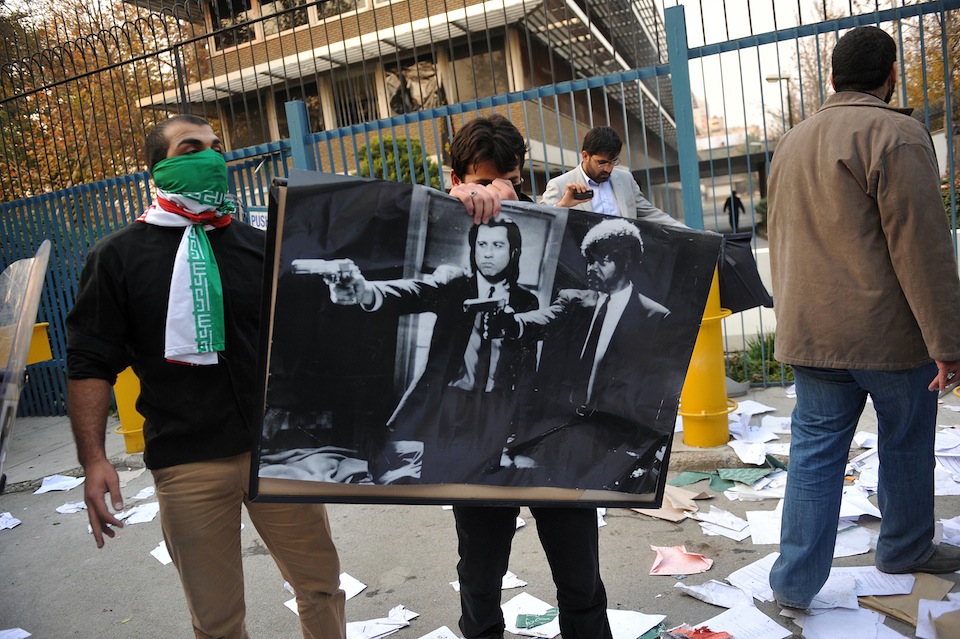UPDATES
Understanding the attack on the British Embassy in Teheran
November 30, 2011 | Daniel Meyerowitz-Katz

Following increasing threats of sanctions over the Iranian nuclear program, as was being progressively reported in the Guardian‘s liveblog, the UK embassy in Iran was stormed last night (Australia time) by a group of supposed “students”. The British government has unequivocally held the Iranian regime responsible.
Even though France has been the strongest European champion of the new round of sanctions, as British journalist Christopher de Bellaigue noted in a 2008 article, the British hold a special place in Iranian paranoia. It should, therefore, be unsurprising that the UK found itself the target of Iranian actions. Some very useful context is given in Fox News by Iran analyst Michael Rubin. As he notes, the Iranian regime had been lashing-out against the UK recently and the “students” were very clearly supporters of some of the more radical elements within the ruling Ayatollahs.
The attack on the embassy follows the Iranian parliament’s decision on Sunday to downgrade relations with Great Britain and expel the British ambassador. That vote was 179 in favor of downgrading relations, and four against with 11 abstentions. Importantly, the four parliamentarians who voted against the measure felt that the Iranian government should go even further and sever relations altogether.
According to Iran’s semi-official Fars News Agency, the radical students carried placards with photographs not only of Majid Shahriari, an assassinated Iranian nuclear scientist, but also Qassem Suleimani, the head of the Qods Force.
Suleimani is one of the Islamic Republic’s darkest figures responsible, according to American diplomatic cables, for running terror networks across Iraq, Afghanistan, and Lebanon. He is perhaps responsible for the deaths of hundreds of Americans and dozens of British troops. As the Islamic Revolutionary Guard Corps consolidates power inside Iran, Suleimani maintains an increasing chance to become president himself, as Iran’s hardline president Mahmoud Ahmadinejad finishes his second and last term.
In fact, as Rubin goes on to explain, using “students” to storm a Western embassy is not a new tactic for Iran. The same methods were employed in an effort to sanction Germany after the Germans condemned Iran for assassinating Iranian dissidents on German soil.
… Three days later, a group of 250 students clashed with police in front of the embassy. The students issued a statement warning, “If ever the Supreme Leader orders us, we will wage a holy war against the infidels.” Referring to the seizure of the U.S. embassy, they continued, “We are conquerors of spy nests.” Iranian authorities promised to protect the embassy. Klaus Kinkel, the German Foreign Minister, noted wryly, “Since suicide commandos only seem to act on orders from the government … we will take the Iranian government at its word.”
Rubin notes in a follow-up post on Commentary that these Iranian actions show that despite the rhetoric, the Islamic Republic is genuinely fearful of further sanctions. Other efforts may also be causing the Iranians to feel more and more under pressure – such as the mysterious explosion in an Iranian nuclear facility on Monday, which followed a similar incident two weeks ago in an Iranian missile base. Satellite images obtained by the Washington Post show that this missile base was destroyed.
On a somber note, four reminders of the threat posed by Iran flew overnight from southern Lebanon into Israel. Jerusalem Post columnist Yaacov Katz explained that Iranian proxy group Hezbollah has been strictly policing the Lebanese border and not allowing rockets to be launched into Israel for over two years. That this truce would be broken just as tension around Iran’s nuclear program reach an all-time high is unlikely to be a coincidence; in fact, it may well be a direct Iranian response to a belief that the two explosions were sabotage, as Israeli bloggerNoah Feldman and Israeli security consultant Daniel Nisman have suggested. Iran’s leaders are trying to send a message of intimidation to every state standing in the way of their nuclear arsenal, but this escalation may well indicate that they are becoming conscious of their vulnerability. If so, this would indicate that by immediately increasing the pressure on Iran and posing sanctions on Iran’s central bank, the Western powers may be able to finally abort Iran’s nuclear race and prevent the disaster that its success would bring. Hopefully, our leaders will have the tenacity to stand up to Iranian attempts at intimidation.
Daniel Meyerowitz-Katz
Tags: Europe





